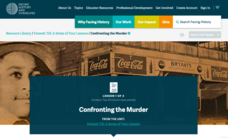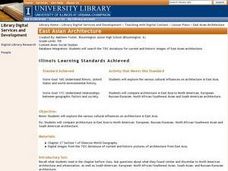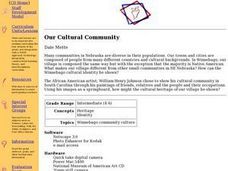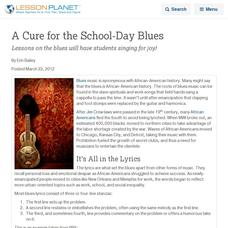Curated OER
Recommend a Book 2
In this book report worksheet, students recommend a book to someone by completing 6 different statements about their selection. First, they describe the book's main subject and point. Then, students write one of the most interesting...
Curated OER
The History of Rice
Fourth graders investigate the history of rice by drawing a timeline of important dates. In this food history lesson, 4th graders research the history of rice, where it came from, and who first used it for food. Students create a...
Curated OER
Jamestown Journey Part 3
Fourth graders study the economy of Jamestown. For this early settlers lesson, 4th graders read about the trade between the English and the natives in Jamestown. This lesson is part of a larger unit and coincides with the novel The...
Small Planet Communications
Civil War
Learners discuss political, social, and personal issues relating to the Civil War from various perspectives using internet sources. Students write various selections from Civil War characters' point of view.
Curated OER
Exploring Cultural Rituals
Students analyze images and music of common rituals in America with those of other countries. They use worksheets to compare and contrast the events.
Curated OER
Assembling A Story
Students observe, discuss, and interpret Radcliffe Bailey's work "By the River" by creating a personal narrative of the 18th or 19th century. Internet access is required and related links are offered for teaching aides.
Curated OER
New World, Old Evils: Latin America and the Holocaust
Pupils examine how Latin America was affected by the Holocaust in Europe. In groups, they research topics related to Latin America and World War II. They interview survivors if possible and discover how entire nations were effected by...
Curated OER
Airborne and Special Operations Museum Scavenger Hunt
In this museum worksheet, students answer 20 questions pertaining to a field trip to this specific museum. This would not be usable unless students were in the museum.
Curated OER
Connecticut Reading Comprehension Activity
In this reading comprehension activity activity, students read 5 paragraphs pertaining to the history of Connecticut and then respond to 30 true or false, multiple choice, and short answer questions.
Curated OER
Fables and Trickster Tales Around the World
Students analyze fables and trickster tales from various cultural traditions. In this fable analysis lesson, students identify the elements of fables and trickster stories. Students read Aesop's fables and Ananse spider stories. Students...
Curated OER
The Legend of Freedom Hill
Third graders complete pre reading, writing, during reading, and interdisciplinary activities for the book The Legend of Freedom Hill. For this reading lesson plan, 3rd graders complete journal entries, go over vocabulary, answer short...
Curated OER
Children of Long Ago
Students complete pre reading, writing, during reading, and interdisciplinary activities for the book Children of Long Ago. In this reading lesson plan, students complete journal entries, answer short answer questions, have discussions,...
Curated OER
Artist Unknown
Students examine how Lennie Gardner's process of discovery about his bronze mask parallels a personal discovery process. They receive an introduction to the art, history, and religion of Benin
Facing History and Ourselves
Emmett Till: Confronting the Murder
The 1955 murder of Emmett Till is often regarded as the catalyst for the Civil Rights Movement of the 20th century. Learn more about the brutal crime—and, as many believe, the miscarriage of justice—that began a national conversation...
Curated OER
East Asian Architecture
Seventh graders compare architecture in East Asia to North American, European, Russian/Eurasian, North African/Southwest Asian and South American architecture. They search the internet for current and historic images of East Asian...
Curated OER
Southeast Asian Architecture
Seventh graders search online for current and historic images of Southeast Asian architecture. They compare architecture in Southeast Asia to North American, European, Russian/Eurasian, North African/Southwest Asian and South American...
Curated OER
Inspiring Freedom: The Remond Family and Abolitionism in Salem
Students examine the abolitionist movement in Salem. Exploring the contributions of the Remond family, they identify how they made the issue one of national and international importance. They discuss the views of the south and how...
Curated OER
Our Cultural COmmunity
Students create tiles to create a project that helps students to reflect upon culture. The concept of multicultural education is necessary to help create a community of learners. Brainstorming is the main skill that is used for students...
Curated OER
A Cure for the School-Day Blues
Lessons on the Blues will have students singing for joy!
Curated OER
Off Times of Slaves on the Sea Islands
Sixth graders explore the aspect of slave life on the Sea Islands. They explore the Gullah language, folk tales, music and games during the "off" times of slaves. Students read and interpret Gullah folk tales. They recognize music in the...
Curated OER
Anti-Lynching Campaigns, 1890-1942
Students examine the differences in opinion between black and white women about putting an end to lynching. They investigate how black activists encouraged white women to join them in their opposition to lynching.
Curated OER
"Water, Water Everywhere and None to Drink"
Ninth graders discover the importance of maintaining an unpolluted source of water for the city. They brainstorm ideas they can take to make their communitie's water better. They can also write letters to their local politicians for help.
Curated OER
Southern Agriculture and the Slave Trade
Students examine the relationship between agriculture and the slave trade during the 1860s. In groups, they research how two factors led to the explosion of slavery in the Southern United States. Using maps, they answer comprehension...
Curated OER
Great Gullah Story Telling Packet
Sixth graders examine the Creole language known as Gullah which is a form of speech comprised of a number of unrelated languages. They determine how slaves used this to communicate so that slave masters would not be able to understand...

























